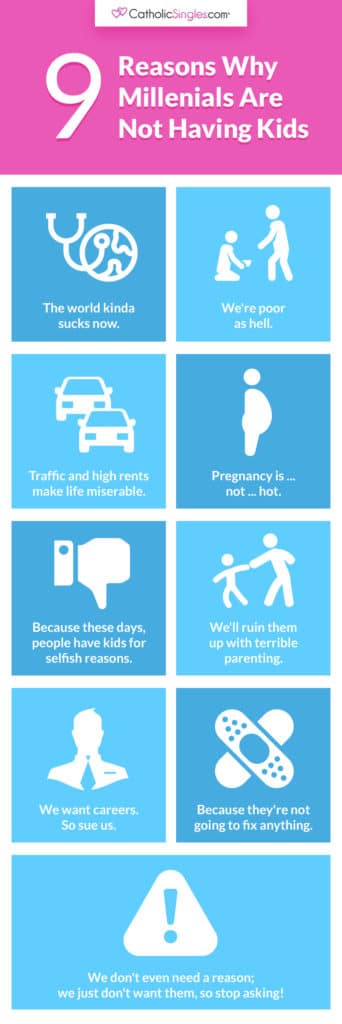 I remember was a little nervous to bring up the topic of future kids with my boyfriend (now husband!), Joseph. I’m the oldest of eight kids, and he is the oldest of two. I had dreams of a big family and a pew full of kids at Mass, and I didn’t know if he’d share my thoughts.
I remember was a little nervous to bring up the topic of future kids with my boyfriend (now husband!), Joseph. I’m the oldest of eight kids, and he is the oldest of two. I had dreams of a big family and a pew full of kids at Mass, and I didn’t know if he’d share my thoughts.
But when things started getting serious enough between the two of us, I knew we needed to talk about our potential future family together. Both Joseph and I brought the topic of future kids up many times through our private conversations and our marriage preparation classes after Joseph proposed.
On our wedding day, ten months later, we stood at the altar and vowed to love each other totally, freely, faithfully and fruitfully. The priest who witnessed our marriage looked us in the eye and asked us a series of questions:
“Joseph and Chloe, have you come freely and without reservation to give yourselves to each other in marriage?
Will you honor each other as man and wife for the rest of your life?
Will you accept children lovingly from God, and bring them up according to the law of Christ and His Church?”
__________
The Catholic Church teaches in the Catechism that marriage by its very nature is ordered towards two things: the good of the spouses and the procreation and education of offspring (CCC 1601). Both the unitive and procreative aspects of marriage are valued enough by the Church that they are included in the marriage vows themselves.

That being said, there are definitely reasons that a couple should avoid pregnancy in their marriage. Each one of those reasons is meant to be prayerfully discerned between the couple and God. But there are some red flags thrown of the field when you’re discerning marriage with someone who responds to conversation about future kids by saying “No kids. Never ever.”
For some millennials, kids are not even on their radar. In a 2016 article, Rooster interviewed millennials and asked them their reasons for not wanting children. In the article, children were referred to as “thankless spawn,” “larval stages of a human money suck,” and “baby blobs.”
Although some of the concerns given for avoiding children are understandable and grounded in facts, some of the reactions that interviewed millennials had to the idea of a future family were problematic, to say the least.
With a little digging, each concern your partner can raise about being hesitant to have kids in the future can be addressed from the Catholic point of view. Here are ways to approach two common topics.
____________________
Your Partner Doesn’t Think Having a Family In The Future Is Going To Help Your Relationship

“But kids aren’t Band-Aids; they’re life sucks who demand your complete attention for a minimum of 18 years.” – Tyler, 27
When discerning marriage with someone, it’s important to realize that children should never be thought of as Band-Aids to fix marriage issues. You shouldn’t want to have children because your relationship is struggling and you think having a baby would revive it. After all, marriages are repaired with grace, hard work, willing the good of the other, and continual effort.
But kids are not ‘life sucks.’ And to call them that greatly misses out on the beauty of children. Children are a gift in marriage and contribute greatly to the good of the parents themselves. In marriage, God invites couples to create with Him through love.
Mirroring the love of the Trinity, the love between a couple becomes so real that nine months later you have to name it. So if your relationship is going through a rocky patch, it may be a good idea to put the conversation about future kids on hold while you repair your relationship.
______________________________
Your Partner Really Doesn’t Have a Reason for Not Wanting Kids; He or She Just Don’t Want Them (So Stop Asking).

“It’s my body and I shouldn’t have to explain to people what choices I make with it.” – Jalise, 31
Parenthood calls us to find the meaning of our lives—a meaning found by sacrifice of our bodies, our time, our plans and our days (and nights). The Catholic Church doesn’t have a list kept in the golden vault at the Vatican of all the reasons you can avoid a pregnancy.
In her book The Sinners Guide to Natural Family Planning, Simcha Fisher writes:
When a married couple decides whether this month is going to make the switch from trying to avoid a pregnancy to trying to conceive, they have to consider the factors of children they already have and children-to-be.
The Catholic Church recognizes the incredible decision that parents will make together. In Gaudium et Spes (50), we find this passage:
“Let them thoughtfully take into account both their own welfare and that of their children, those already born and those which the future may bring. For this accounting they need to reckon with both the material and the spiritual conditions of the times as well as of their state in life. Finally, they should consult the interests of the family group, of temporal society, and of the Church herself. The parents themselves and no one else should ultimately make this judgment in the sight of God. But in their manner of acting, spouses should be aware that they cannot proceed arbitrarily, but must always be governed according to a conscience dutifully conformed to the divine law itself, and should be submissive toward the Church’s teaching office, which authentically interprets that law in the light of the Gospel.”
______________________________
In every situation, we are called to discern future kids responsibly but we are not called to reject parenthood. Even in cases where children are not in the plans for that month, or that year—or for the next five years—we’re called to be open to life.
That could be through loving the children already in the family, or fulfilling the role of parenting through spiritual parenthood. But regardless, openness to love and life is something married couples vow at the altar—and it’s a vow that is meant to be lived on a daily basis.



